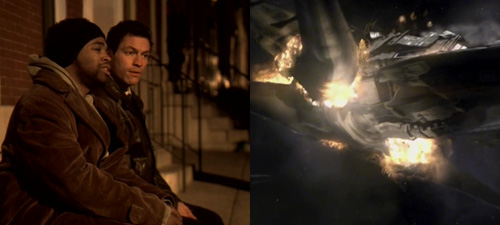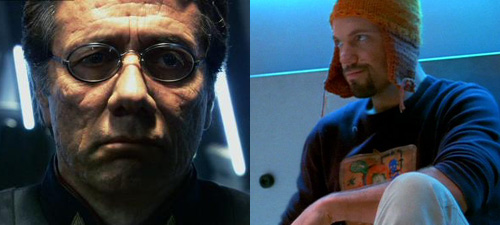For years there have been (at least to my perhaps biased perceptions) two shows that have dominated television critics' articles as the "best shows on TV": Battlestar Galactica and The Wire. I've watched Battlestar since the beginning (and fallen completely in love with it, and become known as something of an evangelist for it), but I was never able to watch The Wire because it's an HBO show. Recently I've finally been able to start watching it--so far, only the first episode--and I've been trying to put my reaction into words. It's a very weird thing, to read about the greatness of something for five-odd years before finally getting to experience it; it's a recipe for overhyped expectations, disillusionment, disappointment. I'm not disappointed, so far; but disillusionment would be a fair assessment. I don't mean that in a bad way--the first episode was great--and to be honest it doesn't so much have to do with the critical praise as it does with the show it's paired with.
Battlestar is a show about the nuclear annihilation of humanity by killer robots and the human survivors' attempts to find a new life and a new way to live. It's a character drama of the highest caliber, yes, but it's also a show with space battles and nuclear showdowns and sex (surprising amounts of sex, really) and all a manner of infantile geek fun. Watching Battlestar, I get to indulge both the intellectual, artistic, philosophical brain and the instinctual, visceral, kiddie brain. And that's not just a great package, it also allows the show to occasionally transform visceral fantasies into their horrifying realities in a moment, twisting the infantile pleasure of watching spaceships blow up into a shocking moment of self-awareness. Which is great and lovely and awesome.
That's not what The Wire is. This should be obvious, of course. The Wire is, after all, a cop show. It's not about nuclear showdowns and killer robots. But somehow, in the years I spent hearing about the other best show on television, I connected the two in my brain, or at least got used to the idea of great television being both entertaining and intelligent. I don't mean to say that The Wire isn't entertaining (even though that's what I just said), but that--well, it's not visceral. There's nothing "awesome" (in the popular sense of explosions and sex) about The Wire, or at least not the first episode. It's very well-written and touches on a lot of important themes and says a lot of important things, but I didn't get a spectacularly wide grin on my face when I watched it like I do with Battlestar or even (to reference a previous post) The Dark Knight.

At left: "The Target", The Wire (2002). At right: "Exodus, Part II", Battlestar Galactica (2006).
That's not a bad thing, necessarily, of course. Or maybe it is. One of my other favorite shows is/was Firefly, the infamously short-changed sci-fi/western from Joss Whedon. Firefly and Battlestar have often been paired as the vanguards of a new type of science fiction. In the sense of "actually really good", that's true, but beyond that there's not a lot to compare them, I think. The striking thing about Firefly (although it's not really striking to anyone familiar with Whedon's work) is its method of combining moments of seriousness and comedy, transitioning between the two smoothly and elegantly, and using the combination of the two to elevate both of them to higher levels. (Whedon talks about this in the director's commentary to Serenity, the Firefly feature film.) Watching Firefly, the drama is more dramatic because of the comedy, and vice versa, much in the same way as the viscerality and intellectualism of Battlestar complement and elevate each other.
I used to just say Battlestar and Firefly were different shows and that's that. I still agree with the first part, but after watching a recent episode, "The Hub", penned by regular Whedon writer Jane Espenson I came to think there's more to say on the subject. (Espenson maintains a blog on writing that has discussed this subject in more detail and with her own expertise weighing in. I whole-heartedly recommend it for any aspiring writer.) While Espenson wrote several Battlestar episodes prior to "The Hub" (she's now a co-executive producer, I believe), this was the first in which a substantial amount of comedy is present. And it made the episode one of the most memorable of the series, as well as making some of the dramatic moments (particularly between the characters of Laura Roslin and Gaius Baltar, around whom most of the earlier comedy is based) strikingly poignant.
Battlestar attempted comedy once before, in a season one episode called "Tigh Me Up, Tigh Me Down". It's one of my favorites from the first season, and I think it's hilarious, but it's a very odd episode, very obviously different from the rest of the series, very obviously intended to be a comedy (albeit, in Battlestar fashion, a very, very dark one). "The Hub" is not like this: the humor doesn't stand out, and the episode contains some of the most serious and important scenes in the series.

At left: Edward James Olmos in "Pegasus", Battlestar Galactica (2005). At right: Adam Baldwin in "The Message", Firefly (2003).
I like Battlestar more than Firefly, but I'm the first to admit that a large part of that may be the fact that I have four seasons of Battlestar to love and not even one complete season of Firefly. I have often wondered if I would have liked Firefly more had it survived--a pointless question, taken superficially, but what I really want to know: is Firefly's style of blending comedy and drama (and not in the asinine "dramedy" that usually manages to accomplish neither, but in a more natural sense) better than the hardcore bleak blackness of Battlestar and (even moreso, it would seem) The Wire? Is the blending of the visceral and the intellectual on Battlestar better than the so-far almost purely intellectual of The Wire?
Since I'm posing the question, of course, I lean towards yes. I won't pretend that I'm sure of that. (And since I'm rather terrible at writing comedy, there's a part of me that would really prefer the answer be no.) But I think what the essence here is not so much comedy and drama, or the intellectual and visceral, but just the idea of combining, blending, mixing. I think that truth, what's right, is in general terms a matter of openness, acceptance, reconciliation. I won't explain fully here--because doing so would be an entirely other, very long essay--but I tend to see things in terms of apophasis (defining things through negatives, or just defining things, putting limits on them, categorizing, and so on) and entanglement (embracing differences, undefinability, the vagueness of existence, and so on). Society, structure, systems (not to mention "the plan") are apophatic, while life and reality is entangled.
Fiction, or art, or any construction (including what is generally termed "non-fiction") lies at an interesting point along this spectrum. As a construction there's an inherent amount of apophasis to a work--there is only what the creator created, right?--but in the end, like everything else, it always becomes entangled. Works come to mean much more than their creators ever intended. And to embrace that, to embrace the undefinability and not try to limit a work to one specific frame, is what's right.
That's a far cry from the difference between comedy and drama or between viscerality and intellectualism, of course. I don't mean to suggest that they're equivalent--or maybe I do. To be honest I'm not sure what I think about all of this. I'm basically just talking out of my ass and hoping to find a solution as I write. It hasn't worked--it rarely does--but I have, I think, managed to organize my thoughts on the subject better. And that will have to do for now.



0 comments:
Post a Comment